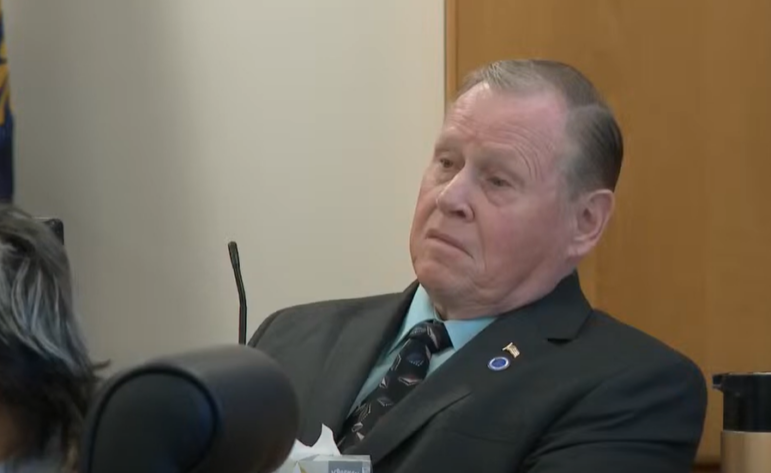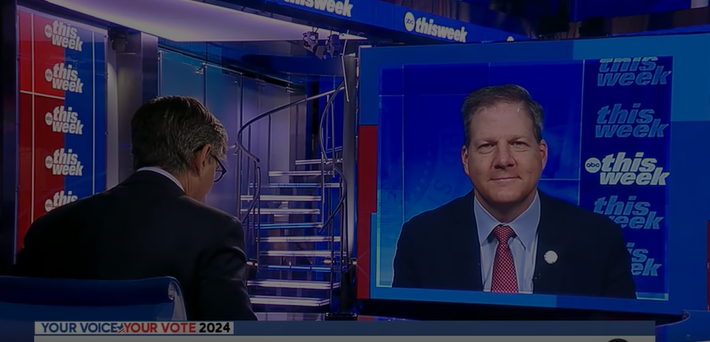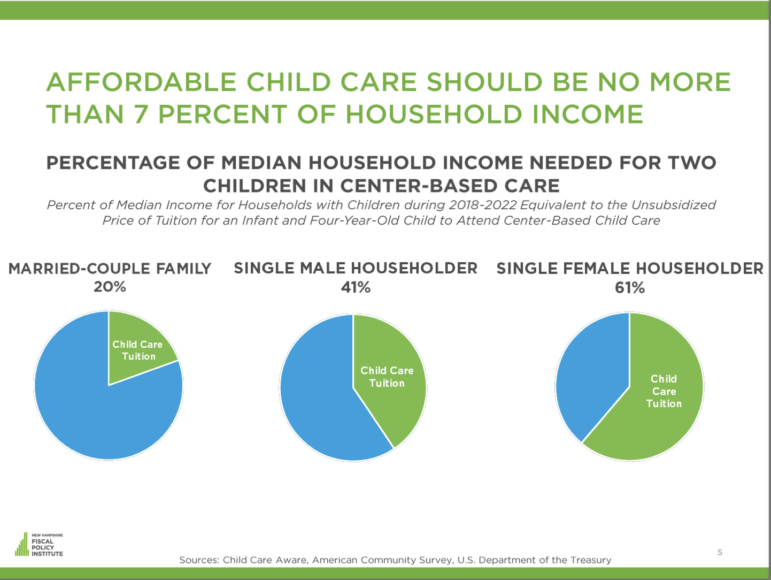By GARRY RAYNO, Distant Dome
The devil is always in the details when it comes to a governor’s budget address and Gov. Chris Sununu’s was no different last week.
He outlined a two-year plan with declining state revenues, and investments largely in education and social services.
No one would quibble about spending more money to improve public education or to expand services for the developmentally disabled, those suffering with mental illness or substance addiction, and at-risk children.
Much like the budget Sununu presented two years ago, there is much to like, but there is also much to ponder on who is served.

Education:
“We focused our investments on our long-term future…Kids.
“I think we can all agree that education is the foundation of a successful community,” Sununu said. “A quality education opens doors and a zip code cannot, and should not, define a child’s chance at success.”
But that is the situation in New Hampshire today as many property-poor districts are in crisis and others stand on the brink.
Sununu proposed using $63 million of the state’s surplus for “targeted school building aid.” The executive summary of his proposed budget says the money will be directed to property-poor districts, but his address did not make that distinction, instead saying it would take the burden off property taxpayers.
But the state’s poorest school districts are not likely to approve new projects because voters will not approve a bond issue by the needed two-thirds majority.
What property-poor districts need is help with operating cost, not capital costs and there is no money in Sununu’s budget to help with operating costs.
And most poor school districts have declining enrollments and do not need new additions anyway.
State building aid is more likely to go to districts with expanding student enrollments like Bedford, Windham and Dover, none a property-poor district.
Although Sununu did not mention it in his budget address, the executive summary distributed by his office claims the budget plan stabilizes and enhances funding for charter schools, which “expands alternative learning environments.” However, the information does not indicate what the enhancement would be.
Sununu’s budget increases special education funding by 20 percent instead of the last decade’s flat funding. Sununu says funding would be at the highest level since 2012. His proposed budget also allocates $8.6 million for tuition and transportation, which is the most ever.
However, increasing special education funding by 20 percent would still be less than needed to fully fund the state’s obligation.
Higher Education
Sununu’s proposed budget targets $24 million to the University System of New Hampshire to expand the capacity of health care and nursing programs, but level funds state aid at $81 million a year, which if that holds true at the end of the budget process in June, although it probably won’t, would mean five years of level funding.
The $81 million is less than the university system received in 2010 before the 2011-12 legislature cut state aid in half and surely will mean tuition increases for students.
Sununu’s budget grants about $1 million annual increases to the community college system, but not the kind of state aid system officials believe is needed.
The budget proposal includes a $32.5 million student debt reduction program modeled on last year’s regenerative medicine program by reconfiguring college bond funds, but the governor’s office did not offer specifics on how.
And Sununu wants to build a new “world class” Childhood Center of Excellence at the University of New Hampshire to replace the Early Childhood Learning Center, which is in need of renovation.
Much like local public schools, the aid to the university and community college system is targeted, not the kind that serves all students in public higher education.
Human Services
Sununu’s budget proposal focuses on two areas: mental health and substance abuse treatment, and the developmentally disabled wait list.
As he did a year ago, Sununu included enough money to do away with the infamous developmentally disabled wait list for people who turn 21 years old and are no longer the responsibility of school districts.
The proposed budget increases funding by $61 million annually which the governor’s office said is enough to end the wait list for the services these individuals critically need.
The problem has been finding enough workers to provide the services and Sununu addresses that by increasing reimbursement rates by 2.5 percent for direct care workers.
Sununu’s budget invests heavily in mental health/substance abuse treatment services.
He proposes building a new $40 million Secure Psychiatric Unit facility taking it out of the men’s prison in Concord. The facility has come under fire due to several well-publicized cases in the last few years.
Sununu proposes to build a new $40 million, 60-bed forensic facility on the grounds of New Hampshire Hospital, which state officials believe will help end people with severe mental illness staying for days in hospital emergency rooms while they wait for an open bed at the state hospital or a community mental health facility.
He plans is to build another 40 transitional beds around the state to help people integrate into their communities and $2 million to encourage hospitals to build designated receiving facility beds and $1 million to develop programs to help the people in those beds.
And Sununu proposes to move adolescents out of the New Hampshire Hospital and into their own facility, likely the John H. Sununu Youth Services Center in Manchester.
“In total, we will be creating 148 new adult placements – critical treatment options – which will eliminate the Emergency Department Waitlist,” Sununu said in his budget address, “with room to spare.”
The state reached agreement on a mental health improvement plan after the federal government and patients sued the state over care.
Sununu’s budget does not include a rate increase for providers in the substance abuse area. When the state ended private insurance for Medicaid expansion recipients and moved them to the state’s traditional Medicaid managed care system, reimbursement rates went down.
New Hampshire has some of the lowest reimbursement rates in the country and providers said they could not afford to stay in business with the lower rates.
The Senate unanimously approved rate increases last week, and the House is expected to do the same.
Contrasts
Sununu’s budget increased funding for the New Hampshire Coalition Against Domestic and Sexual Violence but cut funding in half for New Hampshire Legal Assistance.
His budget allocates $10 million from sports betting for education, but Keno revenues intended to support full-day kindergarten are way short of estimates.
Sununu also touted his paid family and medical leave plan, which is much different than the one approved down party lines in the Senate last week.
This is an issue that will be fought over for the rest of the session.
And Sununu challenged Democrats — who control the legislature — at the end and the beginning of his address in a way that did not encourage cooperation.
Instead, he talked about the billions of dollars in proposed new spending and new tax plans echoing the tax and spend rhetoric heard in the House and Senate from Republicans since the session began.
Several Democratic leaders characterized his words as threats.
Developing a budget requires compromises on all sides, but governors know the real heavy lifting is done by House and Senate budget writers who dig into each line item and often have more up-to-date information than the governor when they put their proposals on the table.
Not too many budgets are vetoed and when they are it often does not end well for the governor. The last two vetoes were in 2015 when former Gov. Maggie Hassan vetoed a budget that she eventually signed with very few changes, and 2003 when former Gov. Craig Benson made a big veto stamp in a very public act. He eventually signed a budget that increased the funds for his office but damaged his relationship with members of his own party for the rest of his one term.
At the end of his budget address Thursday Sununu said, “We have offered a budget free of gimmicks and politics.”
I doubt the majority of legislators agree with that statement.
Garry Rayno may be reached at garry.rayno@yahoo.com
Distant Dome by veteran journalist Garry Rayno explores a broader perspective on the State House and state happenings for InDepthNH.org. Over his three-decade career, Rayno covered the NH State House for the New Hampshire Union Leader and Foster’s Daily Democrat. During his career, his coverage spanned the news spectrum, from local planning, school and select boards, to national issues such as electric industry deregulation and Presidential primaries. Rayno lives with his wife Carolyn in New London. InDepthNH.org is New Hampshire’s only nonprofit, online news outlet dedicated to holding government accountable and giving voice to marginalized people, places and ideas.





